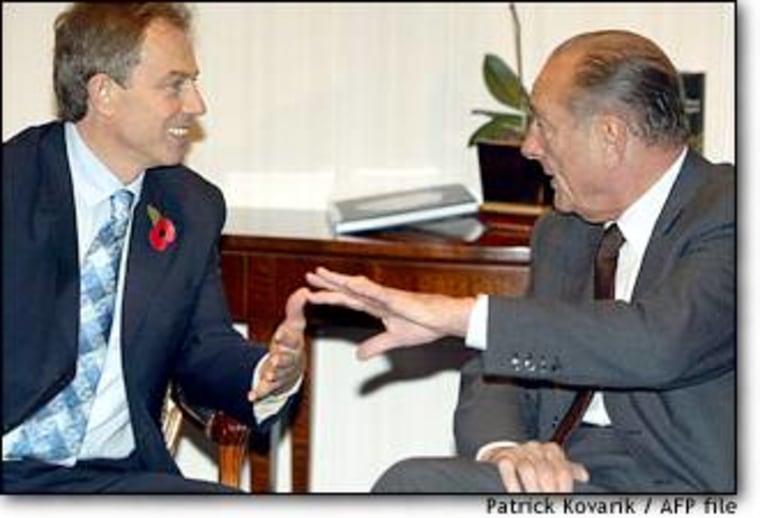They have lived in peace — most of the time. Now France and Britain, separated by only 26 miles of ocean but divided by centuries of mistrust, are butting heads in a row that could further complicate President Bush’s effort to forge a tough U.N. resolution on Iraq.
The genesis was a “vigorous exchange” — diplomaticspeak for a flaming row — between British Prime Minister Tony Blair and French President Jacques Chirac on Friday in Brussels.
So upset was the French leader — “You have been very rude and I have never been spoken to like this before,” Chirac reportedly told Blair — that he canceled the next Anglo-French summit, scheduled for December.
Or as Britain’s racy Sun newspaper reported, citing a Blair aide, “Chirac threw his toys out of the pram.”
The subject was a perennial hot button, the Common Agricultural Policy, a mainstay of the European Union and a cash cow for small farms.
The program is a favorite of nations such as France, which boasts a large agricultural sector, but it is dismissed as too costly and a hurdle to free trade by countries with a larger industrial base, such as Britain.
The EU spends about half its $90 billion annual budget on agricultural aid, about $29 billion of it in direct handouts to farmers.
PLAYING DOWN THE ROW
According to British reports, Blair hinted that France was somewhat hypocritical in championing the cause of African nations while at the same time backing a system that hinders small countries from exporting agricultural goods to Europe.
The British government on Tuesday attempted to play down the tiff. An official, speaking on condition of anonymity, denied that Blair’s exchange with Chirac would prejudice chances of winning French agreement on a U.N. resolution on Iraq.
“The prime minister and the president are used to resolving whatever differences there are in the way that seems best at the time,” the spokesman said. “Their relationship remains as good as ever.”
Daniel Keohane, a research fellow on security and defense policy at the Center for European Reform, a British think tank, also suggested the dispute won’t spill over to the United Nations.
Noting that the two nations have argued in the past over the European budget, he said, “I wouldn’t say it’s a major rift.”
He said that while the British media are splashing the story on front pages, it has received little attention in France.
The reason, Keohane suggested, was that the Blair government may be using the dispute to distract attention from London’s failure to wrest enough concessions from France and Germany on reforming the agricultural policy.
Joanna Apap, a research fellow at the Center for European Policy Studies in Brussels, said there may have been an element of “theater” to the post-meeting pronouncements, although France and Britain do have several areas of dispute, notably Iraq.
But she also noted that Chirac and Blair argued in a mix of French and English, raising the possibility that the Anglo-French breakdown was simply a matter of poor locution.
U.S. DELIBERATIONS
At the United Nations, Britain and France have differed over what to do about Iraq, with Britain siding firmly with the United States.
Both the United States and Britain, veto-wielding members of the Security Council, want U.N. weapons inspectors to return to Iraq only if empowered by a new resolution that would pave the way for military action if Baghdad failed to cooperate.
In the opposite corner are Russia and France, who are reluctant to authorize a war against Iraq and want a two-step process that would allow the Security Council to get a second chance to consider what to do if Baghdad doesn’t help the inspectors.
China, the fifth permanent member of the Security Council, has mostly stayed on the sidelines of the dispute.
The debate, which has raged for six weeks, is fraying the patience of the U.S. administration, which has threatened to take action against Iraq without U.N. approval.
Apart from Britain, most European nations are leery of a new war in the Gulf.
“They don’t feel Blair is giving much space for discussions of any other proposals,” said Apap.
One U.N. diplomat said the dispute between the erstwhile allies “doesn’t help,” although he cautioned that it was unlikely in the long run to affect the debate on Iraq.
“If it were up to France and Britain, the issue (of Iraq) would be solved in an hour,” he said, noting that the driving forces are the United States and Russia.
Instead, the diplomat, who spoke on condition of anonymity, characterized the dispute as “petulant political posturing” by Blair to divert attention from his failure to persuade the EU to reform agriculture policies.
(Sean Federico-O’Murchu is an international producer/editor at MSNBC.com. The Associated Press contributed to this report.)
